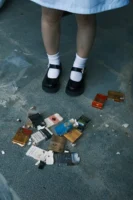What if reggaeton wasn’t just about perreo and partying? What if it could make you think, question society, and even challenge your beliefs? Enter Tego Calderón—the Puerto Rican trailblazer who turned reggaeton into a vehicle for social commentary.
In this article, we’ll dive into five of Tego’s most mind-bending tracks that shattered reggaeton stereotypes, blending infectious beats with razor-sharp lyrics about race, inequality, and identity.
1. “Pa’ Que Retozen” (2002): The Blueprint of Conscious Reggaeton

Before Tego, reggaeton was often dismissed as just club music.
But “Pa’ Que Retozen” changed the game with its unflinching look at street life and systemic oppression.
Lines like “La policía me para, aunque no he hecho nada” (“The police stop me, even though I’ve done nothing”) highlighted racial profiling years before it became a global rallying cry.
Tego himself once said, “I wanted people to dance, but also to open their eyes.”
2. “Loiza” (2003): A Love Letter to Black Puerto Rico
Named after a predominantly Afro-Puerto Rican town, “Loiza” is a celebration of Black identity in a genre that often sidelined it.
Tego’s lyrics—”De Loiza soy, orgullo tengo” (“I’m from Loiza, I have pride”)—reclaimed African roots in a society that still struggles with colorism.
Fun fact: The track’s folkloric bomba beats were a daring fusion that pissed off purists but later became iconic.
3. “Guasa Guasa” (2002): The Satire That Exposed Hypocrisy
Ever heard a reggaeton song roast fake machismo?
“Guasa Guasa” does just that, mocking men who flaunt wealth they don’t have.
Tego’s playful yet cutting flow—”Tú no tienes cuarto y quieres dar consejo” (“You don’t have a room and want to give advice”)—made it a cult classic.
It’s a reminder that reggaeton can be witty, not just gritty.
4. “Abayarde” (2003): The Anthem of Resistance
The title track of his seminal album, “Abayarde” (fire ant), symbolizes Tego’s bite-sized but fiery impact.
With references to colonialism and spiritual resilience, it’s a masterclass in packing depth into a danceable track.
Critics called it “too political”; fans called it a wake-up call.
5. “El Abayarde Contraataca” (2006): Reggaeton Meets Revolution
This sequel track doubled down on activism, sampling Malcolm X and critiquing media manipulation.
Tego raps, “Nos dividen por clases, pero la sangre es una” (“They divide us by class, but blood is one”), blending Pan-Africanism with reggaeton’s swagger.
It’s proof that hip-hop’s consciousness wasn’t lost in translation.
So, next time someone reduces reggaeton to “just party music,” hit them with a Tego track.
His legacy isn’t just in the beats—it’s in the questions they force us to ask.
Which of these songs hit you hardest? Drop a comment and tag someone who needs this history lesson!

Leave a Reply